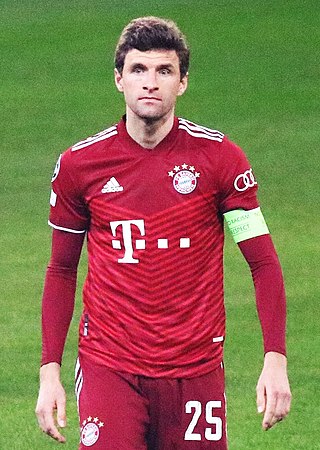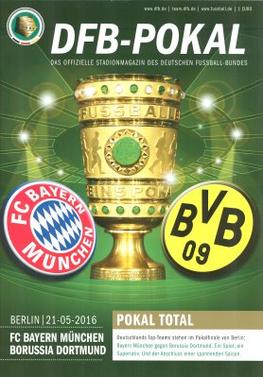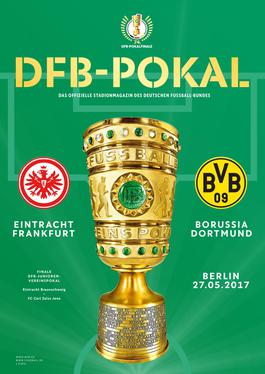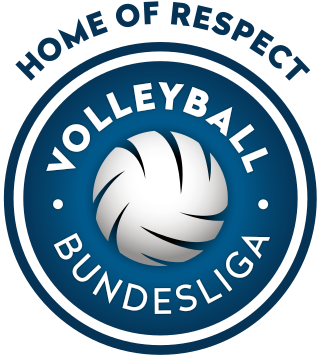Related Research Articles

The DFB-Pokal, also known as the German Cup in English, is a German knockout football cup competition held annually by the German Football Association (DFB). Sixty-four teams participate in the competition, including all clubs from the Bundesliga and the 2. Bundesliga along with the four best teams from the 3. Liga. It is considered the second-most important club title in German football after the Bundesliga championship. Taking place from August until May, the winner qualifies for the DFL-Supercup and the UEFA Europa League unless the winner already qualifies for the UEFA Champions League in the Bundesliga.

The Adler Mannheim is a professional ice hockey team of the Deutsche Eishockey Liga, the highest-level ice hockey league in Germany. The team is based in Mannheim, a city in the northern part of Baden-Württemberg. Currently, the team plays at SAP Arena, where they moved to at the beginning of the 2005–06 season after having played at Eisstadion am Friedrichspark for nearly seven decades from 1938 through 2005. They have won the German Championship a total of eight times, seven of those coming after 1994 in the Deutsche Eishockey Liga.

Thomas Müller is a German professional footballer who plays for Bundesliga club Bayern Munich and German national team. He has been deployed in a variety of attacking roles – as an attacking midfielder, second striker, centre forward, and on either wing. Regarded as one of the best players of his generation, he has been praised for his positioning, teamwork, stamina, and work-rate, and has shown consistency in both scoring and creating goals.

The 2004 DFB-Pokal Final decided the winner of the 2003–04 DFB-Pokal, the 61st season of Germany's premier knockout football cup competition. It was played on 29 May 2004 at the Olympiastadion in Berlin. Werder Bremen won the match 3–2 against second-division Alemannia Aachen, giving them their 5th cup title.

The 2006 DFB-Pokal Final decided the winner of the 2005–06 DFB-Pokal, the 63rd season of Germany's premier knockout football cup competition. It was played on 29 April 2006 at the Olympiastadion in Berlin. Bayern Munich won the match 1–0 against Eintracht Frankfurt via a goal from Claudio Pizarro, giving them their 13th cup title.

Rhein-Neckar Löwen is a professional handball club founded in 2002, based in Mannheim, Germany. The club competes in the German Handball-Bundesliga and continentally in EHF European League. Rhein-Neckar Löwen play their home games in SAP Arena, with a seating capacity of 14,500.
The 2015–16 DFB-Pokal was the 73rd season of the annual German football cup competition. Sixty-four teams participated in the competition, including all teams from the previous year's Bundesliga and the 2. Bundesliga. It began on 7 August 2015 with the first of six rounds and ended on 21 May 2016 with the final at the Olympiastadion in Berlin, a nominally neutral venue, which has hosted the final since 1985. The DFB-Pokal is considered the second-most important club title in German football after the Bundesliga championship. The DFB-Pokal is run by the German Football Association (DFB).

The 2016 DFB-Pokal Final decided the winner of the 2015–16 DFB-Pokal, the 73rd season of Germany's premier knockout football cup competition. It was played on 21 May 2016 at the Olympiastadion in Berlin.

The 2017 DFB-Pokal Final decided the winner of the 2016–17 DFB-Pokal, the 74th season of the annual German football cup competition. The match was played on 27 May 2017 at the Olympiastadion in Berlin.
The 2019–20 DFB-Pokal was the 77th season of the annual German football cup competition. Sixty-four teams participated in the competition, including all teams from the previous year's Bundesliga and 2. Bundesliga. The competition began on 9 August 2019 with the first of six rounds and ended on 4 July 2020 with the final at the Olympiastadion in Berlin, a nominally neutral venue, which has hosted the final since 1985. The DFB-Pokal is considered the second-most important club title in German football after the Bundesliga championship. The DFB-Pokal is run by the German Football Association (DFB).

The 2020 DFB-Pokal Final decided the winner of the 2019–20 DFB-Pokal, the 77th season of the annual German football cup competition. The match was played on 4 July 2020 at the Olympiastadion in Berlin. Though originally scheduled for 23 May 2020, the German Football Association postponed the final on 24 April due to the COVID-19 pandemic in Germany. On 11 May 2020, the DFB Executive Committee approved a resumption of the competition, with the final scheduled for 4 July, subject to political approval, using a hygiene concept similar to that implemented by the DFL in the Bundesliga and 2. Bundesliga. As with other competitions, the match was played behind closed doors without any spectators. Due to the postponement, the match was the first DFB-Pokal final to take place after June since 1974.

The 2021 DFB-Pokal Final decided the winner of the 2020–21 DFB-Pokal, the 78th season of the annual German football cup competition. The match was played on Thursday, 13 May 2021 at the Olympiastadion in Berlin. The match was originally scheduled for Saturday, 22 May 2021, but was moved to an earlier date prior to the completion of the league season in Germany. This was due to fixture density caused by the late start of the season, originating from the postponement of the end of the previous season as a result of the COVID-19 pandemic. As with other competitions, the match was played behind closed doors without any spectators.

The 2019 DFB-Pokal Final decided the winner of the 2018–19 DFB-Pokal, the 76th season of the annual German football cup competition. The match was played on 25 May 2019 at the Olympiastadion in Berlin.
The 2019–20 DFB-Pokal was the 40th season of the annual German football cup competition. 48 teams participated in the competition, including all teams from the previous year's Frauen-Bundesliga and the 2. Frauen-Bundesliga, excluding second teams. The competition began on 3 August 2019 with the first of six rounds and ended on 4 July 2020 with the final at the RheinEnergieStadion in Cologne, a nominally neutral venue, which has hosted the final since 2010. The DFB-Pokal is considered the second-most important club title in German women's football after the Bundesliga championship. The DFB-Pokal is run by the German Football Association (DFB).

The German Women's volleyball League or in is the highest division in German women's volleyball. The German champion has been determined in this competition since the 1976/77 season.
The 2020–21 DFB-Pokal was the 41st season of the annual German football cup competition. Several teams participated in the competition, including all teams from the previous year's Frauen-Bundesliga and the 2. Frauen-Bundesliga, excluding second teams. The competition began on 19 September 2020 with the first of six rounds and ended on 30 May 2021 with the final at the RheinEnergieStadion in Cologne, a nominally neutral venue, which has hosted the final since 2010. The DFB-Pokal is considered the second-most important club title in German women's football after the Bundesliga championship. The DFB-Pokal is run by the German Football Association (DFB).

The 2022 DFB-Pokal final was an association football match played between RB Leipzig and SC Freiburg at the Olympiastadion in Berlin on 21 May 2022. Organized by the German Football Association (DFB), it was the 79th final of the competition and the first match which allowed full capacity in two years, due to the COVID-19 pandemic in Germany.
The 2020–21 Verbandspokal consisted of twenty-one regional cup competitions, the Verbandspokale, the qualifying competition for the 2021–22 DFB-Pokal, the German Cup.

Marie Schölzel is a German volleyball player. She made her début in the national team in 2015, and since 2015 has been playing with Schweriner SC.
The DVV-Pokal für Frauen is the national cup competition of German women's volleyball. The organizer is the German Volleyball Association (DVV). The finals have been held in the SAP Arena in Mannheim since 2016. The current title holders in 2021 are the Schweriner SC.
References
- ↑ OWL Journal (2015-04-09). "DVV-Pokalfinale: Rückblick auf großartige Zeiten im GERRY WEBER STADION" . Retrieved 2020-10-02.
- ↑ Deutscher Volleyball-Verband (2015-04-13). "DVV-Pokalfinale: Am 28. Februar 2016 in Mannheim". Archived from the original on 2016-03-04. Retrieved 2015-04-13.
- ↑ stadionwelt.de: Pokalfinale bleibt in der SAP Arena Archived 2018-03-06 at the Wayback Machine Retrieved 6 March 2018